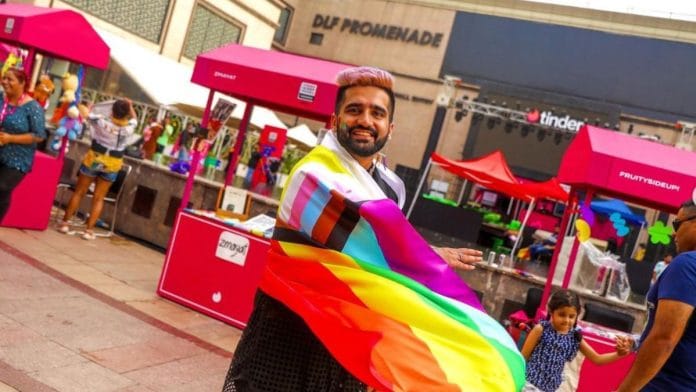New Delhi: After clubs, streets, and art galleries, the desi LGBTQIA+ community is claiming India’s biggest middle-class public space — the malls. At Delhi’s second ‘Queer Made Weekend’, entrepreneurs from the community transformed the city’s posh DLF Promenade mall with hot pink stalls, pop-up bars and rainbow-hued photo booths, inviting visiting families to experience a vivid celebration of gender and sexuality.
Organised by Gaysi Family and Tinder India, the two-day fest had over 30 small businesses and 13 performers. Best described as a desi queer mela, the fest was more than just a pride parade. It was an opportunity for queer entrepreneurs to showcase and profit from their work and for performers to reach a wider audience. The event began in 2021 as an online curation of queer businesses. However, as the pandemic ended, Gaysi and Tinder decided to take the weekend offline.
The organisers believed that there was a demand for real-life spaces to engage with queer communities, and they were right. Nearly 15,000 people attended the event.
Founded in 2008, Gaysi is an offline and online space “for queer folx from across Southeast Asia to share their stories and experiences”. Queer Made Weekend is one of their many initiatives with Tinder India to document and bring desi queer stories to the forefront. The courtyard was filled with music and personal anecdotes from performers and cheers from the audience, the environment of queer joy the organisers envisioned is palpable. From jewellery modelled after gay pioneers like trans activist Marsha P Johnson, queer-themed clothes with pronouns and pride flags, home decor such as rainbow-coloured candles, kink and fetish brands selling handcuffs, leather corsets, belts and whips to NGOs like Rang de Satrangi selling posters which help you come out to your parents to raise money for queer mental health — the length and breadth of queer culture in India was on display.
For the business owners, the weekend was not just about selling their work. Most of them are run by queer couples or by close friends who bonded over their identities. Engagement and empathy are at the core of what they do. The weekend was a chance to inspire others, build networks of solidarity and give the next generations of desi queers a platform of their own.
“It’s a protest…We are all together here to show how talented we all queer enterprises are. And there is no difference between us and you,” said Nihal Pandey, owner of Art Asylum Jewellery.
Also Read: An old Delhi heritage walk that’s not about Jama Masjid, Red Fort. It tells queer histories
A rainbow celebration
Gaysi was intent on making a statement through this weekend. The aim was to increase queer visibility in areas where one would not usually expect to see pride celebrations. It not only gave the LGBTQIA+ community a safe public space, it also gave the general public a chance to engage with queer creators and the community at large.
“It is in a very public space…where anybody and everybody can participate, celebrate and show up for queer businesses,” said Priya Dali, creative director, Gaysi.
And they showed up in their finery — queer folk draped in pride flags, wearing sarees, corsets and sometimes both had taken over the venue that was decked up with fairy lights and rainbows.
Despite Delhi’s humidity, those who came to the fest stayed for hours, exploring the various businesses and grooving to the live music. The crowd only grew as the day went by and the evening picked up pace with queer performers such as the drag artist Rani Ko-He-Nur and singers like John Oinam.
The crowd turned the entire courtyard into their dance floor as musicians performed songs from artists like Taylor Swift and Harry Styles interspersed with their own music.
Strategically placed between two malls, the event was a huge success as far as visibility goes. Those in attendance were not just openly queer people but included families who had come to shop, parents with their queer kids, and even a Buddhist monk.
Also Read: Bending stereotypes on the dance floor—how the queer community is bringing voguing to Mumbai
Lack of intersectionality
Aahana Dhar, communications director, Tinder India, said inclusivity and authenticity are the company’s core values and the inspiration behind the weekend. But the fest faltered in this aspect.
Entry was free, but that was the extent of affordability. Even though the concern of cost was removed there was still a social barrier — entry was limited to people who usually visit malls. One of the stall owners told ThePrint that there was a lack of caste diversity and a certain elitist attitude within the fest.
The setting was also inconvenient for disabled people. While there were wheelchairs available, the venue was not made with wheelchair access in mind. This coupled with a lack of seating left many uncomfortable by the end of the night.
“I don’t think this space is accessible to everybody…As a community, that is something we need to reflectively think about,” said Aabha Joshi, communications coordinator, Nazariya, a queer feminist research group.
While there is a need for self-reflection and greater intersectionality, it would be a mistake to dismiss the weekend entirely for its flaws.
In two years, it has emerged as a safe place for queer people to proudly occupy common urban spaces. Queer entrepreneurs and performers have been given a stepping stone to a wider market.
“When I was a teenager, there’s nowhere on earth I would have thought that people would be so accepting and would be so respectful and happy. Look around, there are people dressed up, they’ve got their pronouns. I think we are arriving,” said Randhir Pratap Singh, owner of the kink brand Subculture.
(Edited by Theres Sudeep)






